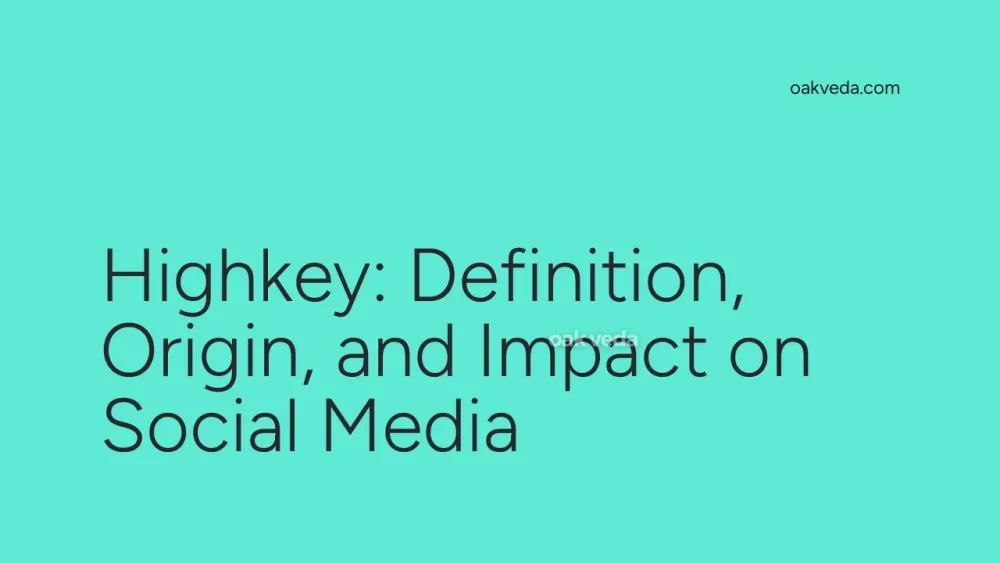
What is Highkey?
Highkey is a popular slang term used in social media and online communication to emphasize or intensify a statement, feeling, or attitude. It's essentially the opposite of "lowkey" and is used to express something that someone wants to brag about or highlight. When someone uses "highkey," they're indicating that they have strong, overt feelings about a particular subject or situation.
Origin and Development of Highkey
The term "highkey" originated in African American Vernacular English (AAVE) as an intensifier. It first emerged in hip-hop culture and has since been adopted by mainstream social media users. The exact timeline of its origin is unclear, but its usage became more widespread in the mid-2010s as social media platforms gained popularity.
It's important to recognize and respect the cultural origins of "highkey" in AAVE. As with many slang terms that enter mainstream usage, acknowledging its roots helps preserve the cultural significance and prevents appropriation without understanding.
How Highkey Works
In social media conversations, "highkey" functions as an adverb or adjective to modify the intensity of a statement. It's often used at the beginning of a sentence to set the tone for what follows. For example:
- "Highkey excited about the new album drop!"
- "This party is highkey lit!"
The term helps users express enthusiasm, agreement, or strong opinions in a casual, relatable way that resonates with online audiences.
Popular Examples of Highkey
To better understand how "highkey" is used in social media, let's look at some popular examples:
- "I'm highkey obsessed with this new Netflix series."
- "Highkey want to quit my job and travel the world."
- "That concert was highkey the best night of my life!"
- "I'm highkey stressed about this exam."
- "This restaurant's food is highkey overrated."
These examples demonstrate how "highkey" can be used to express a range of emotions and opinions, from excitement and desire to stress and disappointment.
Impact of Highkey on Social Media Culture
The widespread use of "highkey" has significantly impacted social media culture in several ways:
-
Expressive communication: It allows users to convey stronger emotions and opinions in a concise manner, fitting well with the fast-paced nature of social media.
-
Trend-setting: As a popular slang term, "highkey" has become part of the ever-evolving social media lexicon, influencing how people communicate online.
-
Cultural exchange: The mainstream adoption of "highkey" has led to increased awareness of AAVE and its influence on popular culture.
-
Meme culture: The term has been incorporated into numerous memes and viral content, further cementing its place in online communication.
-
Generational divide: Like many slang terms, "highkey" is more commonly used by younger generations, creating a linguistic marker that can distinguish between different age groups on social media.
How Brands and Influencers Use Highkey
Savvy brands and influencers have recognized the power of incorporating "highkey" into their social media strategies:
-
Relatable content: By using "highkey" in their posts, brands can appear more relatable and in touch with their younger audience.
-
Emphasis on product features: Brands might use "highkey" to highlight specific product features or benefits, e.g., "Our new sneakers are highkey comfortable!"
-
Engagement boosting: Influencers often use "highkey" to express strong opinions or emotions, which can drive engagement and spark conversations in their comments sections.
-
Trend participation: When "highkey" is part of a trending topic or challenge, brands and influencers can use it to join the conversation and increase their visibility.
Future Trends Related to Highkey
As social media language continues to evolve, we can expect to see some trends related to "highkey":
-
New variations: Just as "highkey" evolved from "lowkey," we might see new intensifiers or modifiers emerge in the future.
-
Cross-platform usage: While currently popular on platforms like Twitter and TikTok, "highkey" may spread to other social media platforms or even traditional media.
-
Potential overuse: As with many trendy terms, there's a risk of "highkey" becoming overused, which could lead to it falling out of favor or being seen as cliché.
-
Integration into marketing language: More brands may incorporate "highkey" into their marketing strategies, potentially leading to new, creative uses of the term.
FAQs about Highkey
-
Is "highkey" the opposite of "lowkey"? Yes, "highkey" is generally considered the opposite of "lowkey" in terms of intensity and openness of expression.
-
Can "highkey" be used in formal communication? No, "highkey" is considered informal slang and is not appropriate for formal communication or professional settings.
-
Is it offensive to use "highkey" if I'm not part of the AAVE-speaking community? While "highkey" has entered mainstream usage, it's important to be respectful of its origins and use it appropriately without mocking or appropriating AAVE culture.
-
How do you use "highkey" in a sentence? You can use it as an adverb or adjective, typically at the beginning of a sentence or before the word it's modifying, e.g., "I'm highkey excited" or "That's highkey amazing!"
-
Will using "highkey" make my social media posts more engaging? While using trendy terms like "highkey" can make your posts more relatable to certain audiences, authentic and valuable content is more important for long-term engagement.
In conclusion, "highkey" has become a significant part of social media language, allowing users to express strong emotions and opinions concisely. Understanding its origins, usage, and impact can help both individuals and brands communicate more effectively in the ever-evolving landscape of online interaction.
You may be interested in:
- Inbound Marketing: Definition, Origin, and Impact
- Sus: Definition, Origin, and Impact on Social Media
- CEO on Social Media: Definition, Origin, and Impact
- ISO: Definition, Origin, and Impact on Social Media
- Customer Reviews: Definition, Origin, and Impact
- Cap: Definition, Origin, and Impact on Social Media

